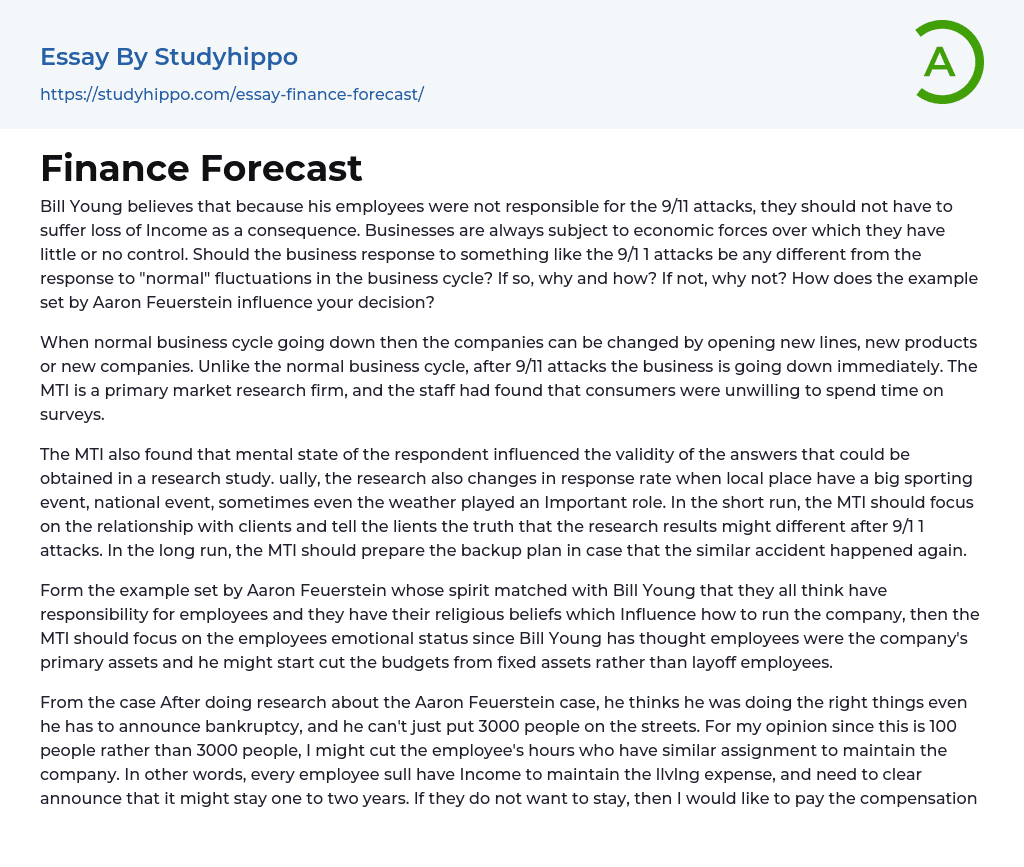Bill Young argues that his employees should not suffer from a loss of income due to the 9/11 attacks since they were not responsible for it. He believes that businesses are constantly subjected to economic forces beyond their control. Therefore, he questions whether the response of businesses to the 9/11 attacks should be different from their response to regular fluctuations in the business cycle. Young seeks an understanding of why and how it should differ or if there should be no difference at all. Additionally, he takes into consideration Aaron Feuerstein's example and how it impacts his perspective.
Typically, during a decline in the normal business cycle, companies can adapt by introducing new products or companies. However, unlike regular business cycles, the business immediately suffered a decline after the 9/11 attacks. The MTI, a market research firm, discovered that consumers were
...unwilling to participate in surveys during this period.
The MTI observed that the mental state of the respondent influenced the credibility of the research findings. Moreover, response rates were found to fluctuate based on local happenings such as sports events, national occasions, and even weather conditions. In the near future, it is imperative for the MTI to give priority to client relationships and notify them about the potential influence of the 9/11 attacks on research outcomes. For a sustainable approach, the MTI should formulate contingency strategies in case of future occurrences resembling this situation.
Both Aaron Feuerstein and Bill Young have a sense of obligation towards their employees, with their religious beliefs impacting the way they manage their respective companies. This example suggests that the MTI should give priority to the emotional welfare of its employees. Bill
Young recognizes employees as the company's most valuable resources and might contemplate cutting budgets for fixed assets rather than resorting to employee layoffs.
After studying the Aaron Feuerstein case, I am convinced that he acted correctly by avoiding bankruptcy and refraining from laying off 3000 employees. In my viewpoint, as we only have a workforce of 100 individuals, we could lessen their working hours to sustain the company's operations. By doing so, each employee would still receive some income to meet their living expenses. It is crucial to communicate transparently that this arrangement might persist for one to two years. If any employee prefers not to continue under these conditions, I am prepared to offer compensation.
- Money essays
- Financial Accounting essays
- Market Segmentation essays
- Supply And Demand essays
- Purchasing essays
- Forecasting essays
- Legacy essays
- Bank essays
- Corporate Finance essays
- Financial News essays
- Financial Ratios essays
- Financial Services essays
- Free Market essays
- Shareholder essays
- Personal finance essays
- Equity essays
- Financial Crisis essays
- Banking essays
- Credit Card essays
- Currency essays
- Debt essays
- Gold essays
- Loan essays
- Enron Scandal essays
- Foreign Exchange Market essays
- Investment essays
- Venture Capital essays
- Stock Market essays
- Retirement essays
- Donation essays
- Net Present Value essays
- Income Statement essays
- Commercial Bank essays
- Debit Card essays
- Deposit Account essays
- Subprime Lending essays
- Perfect Competition essays
- Underwriting essays
- Synergy essays
- Valuation essays
- Investing essays
- Asset essays
- Depreciation essays
- Discounted Cash Flow essays
- Foreign Direct Investment essays
- Funds essays
- Internal Rate Of Return essays
- Revenue essays
- Day Trading essays
- Futures Trading essays




